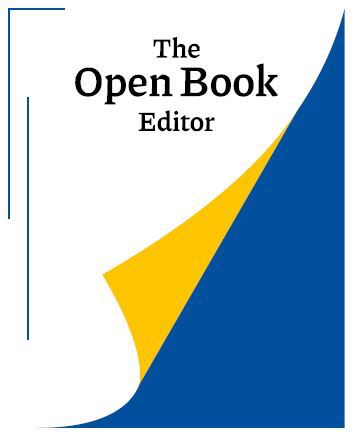The publishing industry is so obscure and guarded that myths about writing have become extremely common. We imagine authors as intellectual recluses hunched over their typewriters, effortlessly creating literary magic (with the help of a muse, of course). But some of these writing myths can be dangerous. Often, they leave aspiring authors with a skewed sense of what to expect. Like with any other profession, there are challenges to the writing life. It’s not easy being a writer, not to mention a working author, so it’s important to have realistic expectations.
You’re probably familiar with a few writer myths yourself—even the online writing community perpetuates them. But how do you know which ones are fact and which are fiction? Below, we debunk five of the most popular myths about writing and show you the must-know facts of the writing life.
Myth #1: Writing a book is easy

Fact: Writing a book can be daunting, even for seasoned authors.
One of the most common myths about writers is that writing is easy. After all, everyone can do it, right? We all learn to write in school and, as adults, writing forms a part of our daily lives. We write emails, text messages, and work proposals, so surely writing a book should come easily. Isn’t it as simple as sitting down and putting words on paper?
While this is technically the case, there’s so much more to it than that. Regardless of whether you’re writing fiction or non-fiction, you still need to be able to construct a tight plot across many chapters. The average book word count (which varies depending on genre) is between 70,000 and 120,000 words. That’s a lot more than your average day-to-day writing! On top of that, you need to be able to create a coherent story that keeps readers engaged from beginning to end.
Because this writing myth is so persistent, most aren’t aware of the stamina needed just to finish the first draft of a manuscript. Not to mention being able to put in the hours it takes to rewrite and revise after you’ve finished your first draft! In his book, What I Talk About When I Talk About Running, novelist Haruki Murakami goes so far as to compare writing a novel to running a marathon. You have to put in daily training to build up the endurance needed to write a book readers can’t put down.
Myth #2: Writers only write when they’re inspired
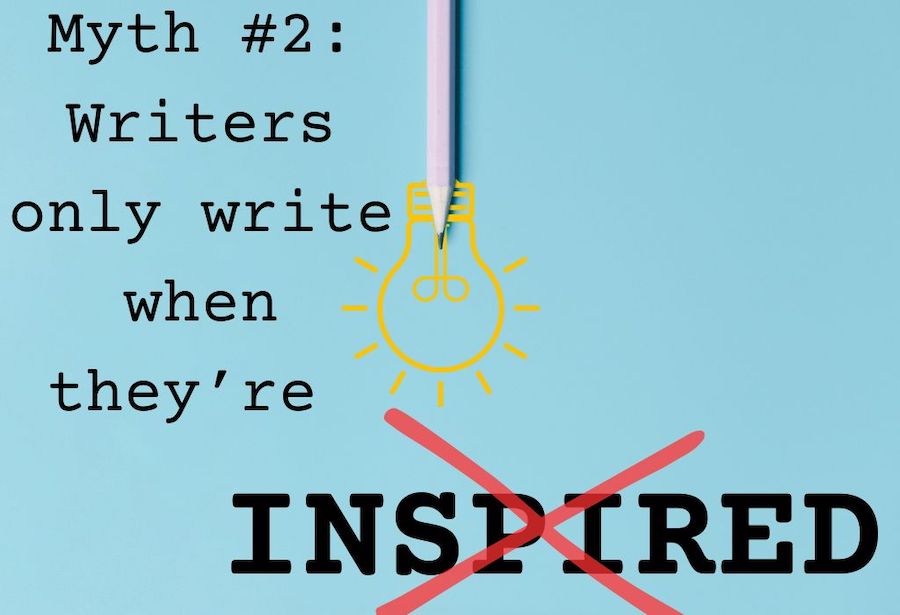
Fact: Writers need to find ways to stay inspired, and be able to write when they’re not.
It’s a common misconception that writers sit around waiting for their muse to arrive, only writing when they feel inspired. Some of this arises from stories of writers experiencing short, intense periods of creativity. Legends abound about authors like Jack Kerouac, who penned On the Road in two to three weeks. Or Ray Bradbury, who wrote his famous Fahrenheit 451 in a mere nine days.
However, tales like these are the exception and not the rule. Keep in mind that even though both Kerouac and Bradbury finished these novels at a record-fast pace, they’d both already been showing up daily to write for years. And they still had to put in significant time afterwards to revise their novels.
The majority of authors have a writing routine that sustains creativity over the long haul, not just for short bursts of inspiration. Stephen King, Ernest Hemingway, and Haruki Murakami are just a few big names who espouse(d) the benefits of a regular writing habit. As a writer, you too should consider starting a daily writing routine. It teaches you the valuable skill of showing up first and doing the work, no matter what. And when you show up consistently, so does your muse!
Myth #3: Talent is the most important part of writing
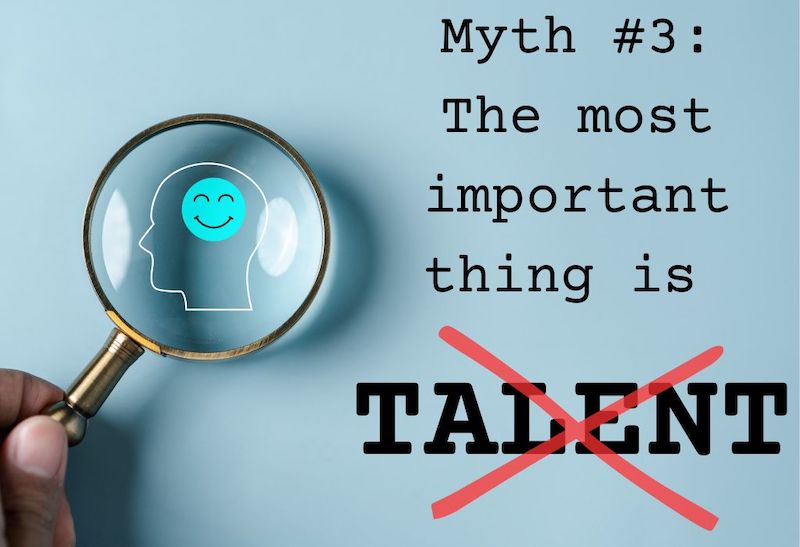
Fact: You won’t get anywhere without hard work.
One of the more prevailing writing myths is that writers are born with the innate ability to write. We tend to talk about the greats like Tolstoy and Hemingway as literary geniuses. As if their talent was the most important contributor to their success.
While talent certainly helps, it’s not the most important aspect of the writer’s life. Yes, Tolstoy and Hemingway had talent in spades. However, they wouldn’t have achieved anything without discipline and commitment to their craft. Which is great news for the rest of us writers! Because you can’t control how much talent you’re born with. BUT you can control how hard you work to improve your skills!
You’ll need discipline and commitment to finish your first draft, edit your book, and query it when the time comes. Publishing—whether you plan to query literary agents or self-publish your book—is tough. Writers who rely too heavily on talent to carry them along may end up taking shortcuts or not putting in the work needed for the long haul.
Like Stephen King (who is famous for his insane work ethic) said: “Talent is cheaper than table salt. What separates the talented individual from the successful one is a lot of hard work.” At the end of the day, talent is a bonus but it can’t supplement hard work.
Myth #4: You’ll get rich if you become a best-selling author

Fact: Publishing is a competitive industry and it usually takes years to build any kind of success.
The writer’s life is often glamourised. There’s a pervasive myth that best-selling authors achieve fame and fortune from their books. Of course, these stories come from somewhere. We’ve all heard of authors receiving seven-figure publishing deals, selling millions of copies of their novels, and going on global book tours to meet adoring fans. While these things can happen, they are incredibly rare. So much so, they’re often referred to as the ‘unicorns’ of the publishing world.
The reality is, publishing—whether it be through traditional means or self-publishing—is highly competitive. Even best-selling authors aren’t swimming in cash. Most have to work other jobs, or have a partner earning a stable income, in order to support themselves.
Quick financial success from writing is mostly a myth. The average advance in traditional publishing for debut authors is around the low-to-mid-five figures (usually paid out over multiple books or years), and the average self-published book will sell less than 250 copies. All this after years of writing, revising, rejection, and persistence. It can take a long time to build up a significant reading base and earn steady money from writing books.
This is why it’s so important to take steps to give yourself the best chance at success:
- Learn how to become a great self-editor.
- Join a writing group or find beta readers to read your work and provide objective critiques.
- Hire a professional editor to give your book the extra polish it needs.
- If self-publishing, consider paying for book formatting services like what we offer at The Open Book Editor. This way you know your book is in the proper format for optimal reading.
- Learn what makes a marketable book and strategies for marketing your book.
- Revise, revise, revise. This goes for everything—from your manuscript to your query letter to your blurb, and so on. You only have one chance to make a great first impression, so do everything you can to perfect your work and make it count.
Myth #5: Reading books by other authors will negatively affect your style
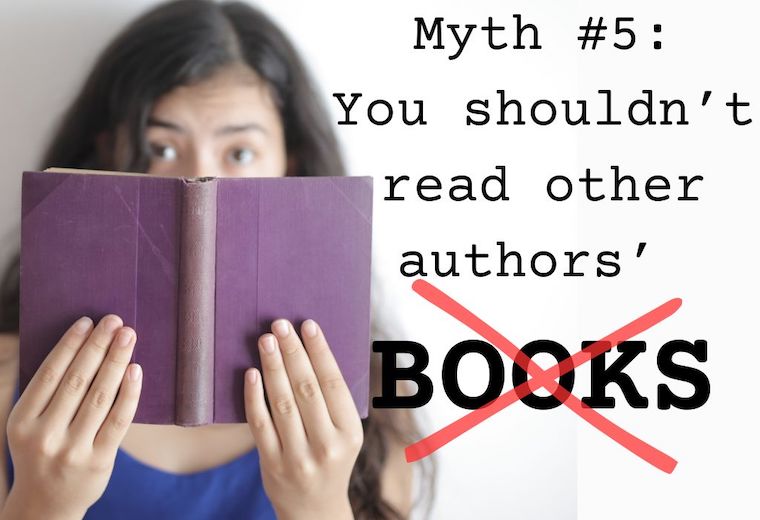
Fact: Reading widely will make you a better writer.
In order to be a good writer, you must read other authors’ work. A writer who doesn’t read would be the equivalent of a musician who doesn’t listen to music by other musicians, or a director who doesn’t watch other people’s films or TV series. Essentially, you have to consume other art to know what works.
Reading a lot will teach you about different writing styles. You’ll also learn what to expect from different genres, how to write a great scene, how to craft complex characters, and what works (or doesn’t!) within a narrative. While you will acquire some of this knowledge as you write, learning from already published authors is still invaluable.
And if you’re worried about another author’s voice affecting yours, don’t! Obviously, you will be influenced by other writers—most authors are—but, over time, you’ll learn what makes your voice unique and how to use it effectively. In fact, you’re more likely to develop and better understand your voice by reading other authors, learning what you do well, where you can improve, and what to avoid.
Is the writer’s life worth it?
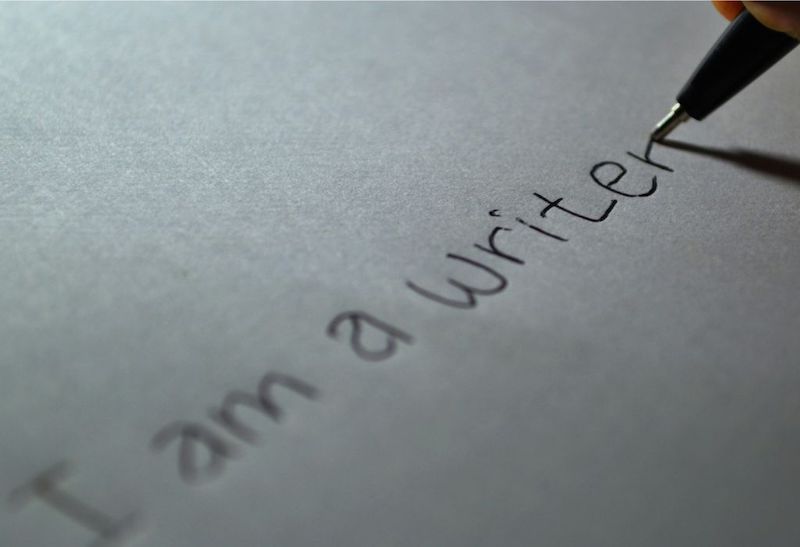
Hearing these writing myths can have a negative effect on aspiring authors. You may fear you lack enough talent to write or feel discouraged when you don’t achieve the sort of success you envisioned. Which is why it’s so important to debunk them! The biggest fact of the writer’s life is that writing, especially over the long term, is hard work. It should never be considered a quick or easy pathway to success. Having a realistic approach will prepare you for the realities of writing, editing, and publishing.
Obviously, only you can determine if life as a writer is worth it. But don’t be dismayed by the potential challenges you might face. There are so many big payoffs in writing that make it feel worthwhile, too! Finishing a whole book, becoming better at your craft, and learning the discipline necessary to succeed are all incredibly fulfilling. While the destination (holding your published book in your hands) is important, so is the journey to get there. So, keep writing because you love it, and enjoy discovering where the writing journey takes you!
